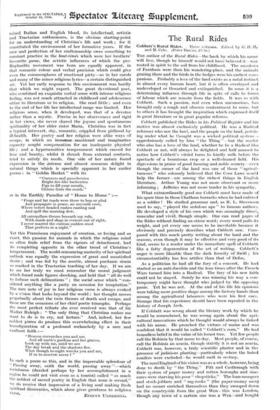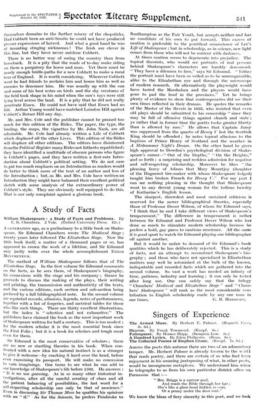The Rural..Rides Cobbett's Rural Rides. _ Three volumes. Edited by
G. D.11., and EL Cole. (Peter Davies, £5 56) TuE author of the Rural Rides—the book by which his name will live, though he himself would not have believed it —was rooted in spirit to the soil from his childhood. The meadows of Farnham were then his wandering-place, and the animals grazing there and the birds in the hedges were his earliest com- panions. Probably a love of the land exists as a natal instinct in almost every human heart, but it is often overlayed and undeveloped or thwarted and extinguished. In some it is a determining influence through life in spite of calls to forms of labour which are remote from the fields. It was so with Cobbett. Such a passion, real even when unconscious, has brought only a rough and obscure contentment to some, but to others it has brought the inspiration which expressed itself in great literature or in great popular reforms.
Cobbett published the Rides in his Political Register and his motive was almost exclusively political. He was a Radical reformer who saw the land, and the people on the land, perish. ing under what he thought was a wicked political system— opprobriously called by him " the Thing "—but the reader who also has a love of the land, whether he be a Radical like Cobbett or not, will always be delighted and half amused to notice how Cobbett's vitriol turns to kindly milk before the spectacle of a bounteous crop or a well-cleaned field. His digressions in praise of good farming and noble scenery—even though the owner of the land was one of those " agricul- turasses " who solemnly believed that the Corn Laws would help the farmer—are among the richest things in English literature. Arthur Young was not more observant or more informing ; Jefferies was not more tender in his sympathy.
What extraordinarily good use Cobbett must have made of his spare time in those Chatham barracks when he had enlisted as a soldier ! He studied grammar and, as R. L. Stevenson used to say, " played the sedulous ape " to famous authors. He developed a style of his own which was amazingly direct, muscular and vivid, though simple. One can read pages of the Rides without finding an otiose word ; every word pulls its weight, and yet every one seems to be inevitable because it obviously and precisely describes what Cobbett saw. Com- pared with this much pretty writing about the land and the seasons, even though it may be effective and very good of its kind, seems to a reader under the immediate spell of Cobbett like a fatty degeneration of the art of writing. Cobbett's anger is more likeable than the dark ferocity of Swift ; his circumstantiality has less artifice than that of Defoe.
As a politician he had all the fury of a convert. He had started as an anti-Jacobin and the lean times after the French Wars turned him into a Radical. The fury of his new faith could not be stayed. Surely he was winning his way a con- temporary might have thought who judged by the opposing panic. Yet he was not. At the end of his life his opinions were taking more positive shape among the factory hands than among the agricultural labourers who were his first care. Strange that-his experience should have been repeated in the history of Joseph Arch.
If Cobbett was wrong about the literary work by which he would be remembered, he was wrong again about the agri- cultural innovations which he thought would always be linked with his name. He preached the virtues of maize and was confident that it would be called " Cobbett's corn." He had boundless belief in the value of his locust tree. Yet few people call the Robinia by that name to-day. Most people, of course, call the Robinia an acacia, though strictly it is not an acacia. Cobbett was, however, a truly scientific planter and in the presence of judicious planting—particularly where the hated conifers were excluded—he would melt in ecstasy.
The rural England of his vision was as a whole, however, being done to death by " the Thing." Pitt and Castlereagh with their sYsteni of paper money and rotten boroughs and sine- cures were starving his poor " chopsticks." The loan-mongers and stock-jobbers and " rag-rooks " (the paper-money men) had no sooner enriched themselves than they swooped down on the countryside from the great Wen—this was London, tlicaigh-any town-of a certain size was a Wen-and boiignt themselves domains to the further misery of the chopsticks; Had Cobbett been an anti-Semite he could not have produced grosser expressions of hatred. And what a good hand he was at inventing stinging nicknames ! The Irish are clever in this line, but they have never outdone Cobbett.
There is no better way of seeing the country than from horseback. It is a pity that the roads of to-day make riding on them a purgatory for horse and man. Yet there must be nearly enough bridle-paths for a new Cobbett to make a rural tour of England. It is worth considering. Wherever Cobbett went he had friends to acclaim him and house him as well as enemies to denounce him. He was usually up with the sun and some of his best notes on birds and the shy creatures of the field took shape in his mind when the sun's rays were still lying level across the land. It is a pity that he did not really penetrate Essex. He could not have said that Essex had no hill. Arthur Young would have matched Laindon Hill against Cobbett's Butser Hill any day.
Mr. and Mrs. Cole and the publisher cannot be praised too much for this edition of the Rides. The paper, the type, the binding, the maps, the vignettes by Mr. John Nash, are all admirable. Mr. Cole had already written a Life of Cobbett which displaced all the other Lives. This edition of the Rides will displace all other editions. The editors have disinterred from the Political Register many Rides not hitherto republished ; they have identified a multitude of obscure persons who figure in Cobbett's pages, and they have written a first-rate Intro- duction about Cobbett's political setting. We do not care to put too much emphasis on an Introduction as readers would do better to think more of the text of an author and less of the Introduction ; but, as Mr. and Mrs. Cole have written an Introduction they might have balanced their excellent political sketch with some analysis of the extraordinary power of Cobbett's style. They are obviously well equipped to do this. That is our only complaint against a glorious book.

























































 Previous page
Previous page